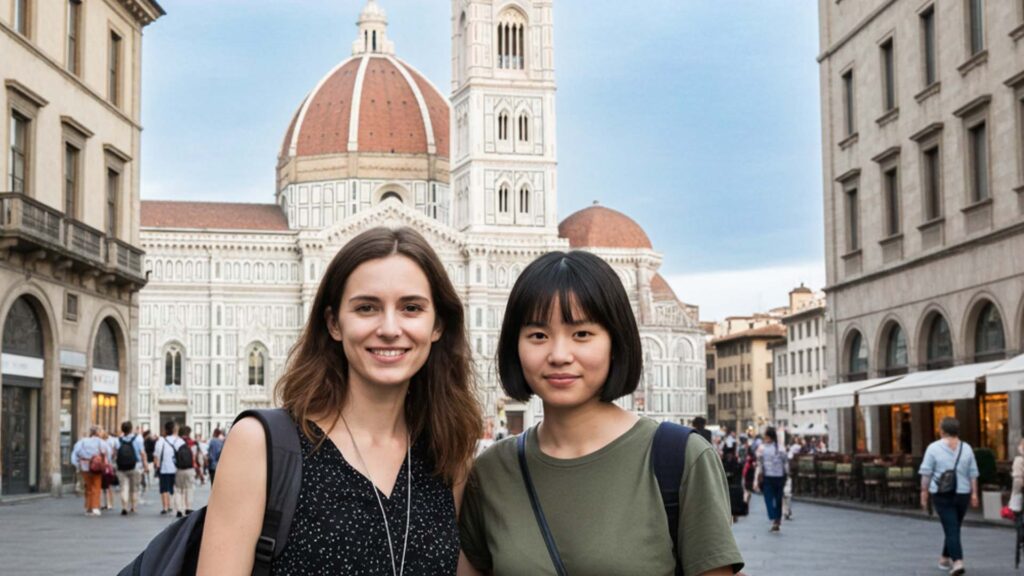Table of Contents
Florence—the birthplace of the Renaissance, where cobblestone streets wind past centuries-old palazzos, where Michelangelo’s David stands in silent testimony to human creativity, and where every piazza tells a story. If you’re considering studying abroad in Florence, you’re not just choosing a destination; you’re choosing transformation.
This comprehensive guide covers everything you need to know about study abroad in Florence, from practical logistics to life-changing experiences that await in this extraordinary Italian city.
Why Study Abroad in Florence?
A Living Classroom
When you study abroad in Florence, Italy, the entire city becomes your classroom. Art history lectures aren’t confined to textbooks—they happen in front of Botticelli’s Birth of Venus at the Uffizi Gallery. Architecture courses take place beneath Brunelleschi’s dome. Business students analyze family-owned enterprises that have thrived for generations in the same narrow streets.
Florence attracts over 12 million visitors annually, yet beneath the tourist veneer lies a city grappling with contemporary challenges: sustainable tourism, urban planning, social equity, and environmental innovation. For students, this creates an unparalleled opportunity to study real-world problems in a historically rich context.
Florence's Green Renaissance
While Florence is famous for its artistic Renaissance, the city is now experiencing what many call a “Green Renaissance.” The city has been recognized in the Carbon Disclosure Project’s ranking of 88 leading cities acting against climate change and received dual awards from Lonely Planet’s Best in Travel 2021 for both community and sustainability initiatives.
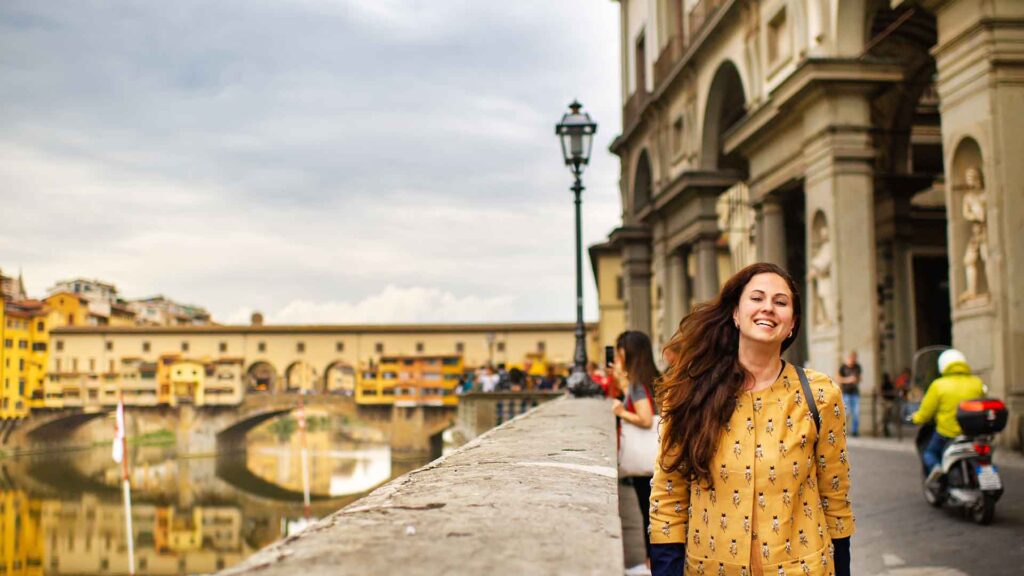
Recent urban initiatives include:
- Expanded pedestrian zones to reduce air pollution and preserve historic monuments
- Zero-volume urban planning that prevents adding more concrete to the city
- Multi-tiered recycling systems and brownfield site regeneration
- Bike-sharing programs and electric scooter networks
- The Slow Food movement, which originated in Italy and promotes sustainable, local food systems
This makes Florence an ideal location for students interested in sustainability, urban planning, environmental studies, and innovative solutions to modern challenges.
Academic Programs: Finding Your Path
Program Types and Durations
Florence study abroad programs come in various formats to fit different academic schedules:
Spring Programs (12-17 weeks): These immersive experiences allow you to take 12-15 credits and truly settle into Florentine life. You’ll have time to build relationships with locals, develop language skills, and explore beyond the tourist hotspots.
Summer Programs (4-8 weeks): Intensive summer sessions offer 6-9 credits and pack maximum learning into shorter timeframes. Perfect for students who can’t commit to a full semester but still want meaningful international experience.
Fall Programs (12-15 weeks): Fall semester programs offer the full academic experience with vibrant autumn colors, harvest season in Tuscany, and fewer tourists than spring. Perfect for students who want to experience Florence during one of its most authentic seasons.
To learn more about these programs, click here.
Innovative Approaches to Learning
The best programs move beyond traditional classroom instruction. Look for programs that offer:
- Experiential learning: Site visits to local organizations, businesses, and community initiatives
- Project-based learning: Working on real challenges facing Florence and developing tangible solutions
- Community engagement: Volunteering with local nonprofits, language exchanges with Italian students, or participating in neighborhood initiatives
- Field studies: Using Florence and Tuscany as living laboratories for your academic interests
- Global-local connections: Pioneering approaches that connect global challenges like the UN Sustainable Development Goals with local contexts, helping students understand how international frameworks translate into real community action
Life in Florence: What to Expect
The City Layout
Florence is remarkably compact—you can walk from one end of the historic center to the other in about 30 minutes. The city center has limited vehicle access, making it a walker’s paradise (though watch out for those cobblestones!). Key neighborhoods include:
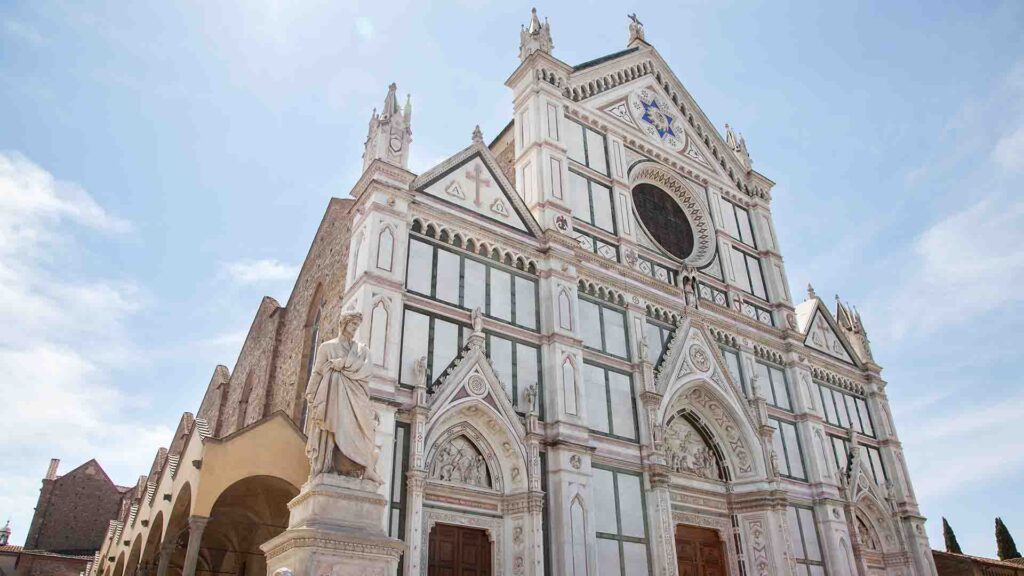
- Santa Croce: Lively and authentic, home to the famous basilica and a thriving local scene
- Santo Spirito: Artsy and bohemian, with a piazza that comes alive at sunset
- San Lorenzo: Bustling with the famous market and close to the Duomo
- Oltrarno: “Beyond the Arno,” where artisans’ workshops still operate as they have for centuries
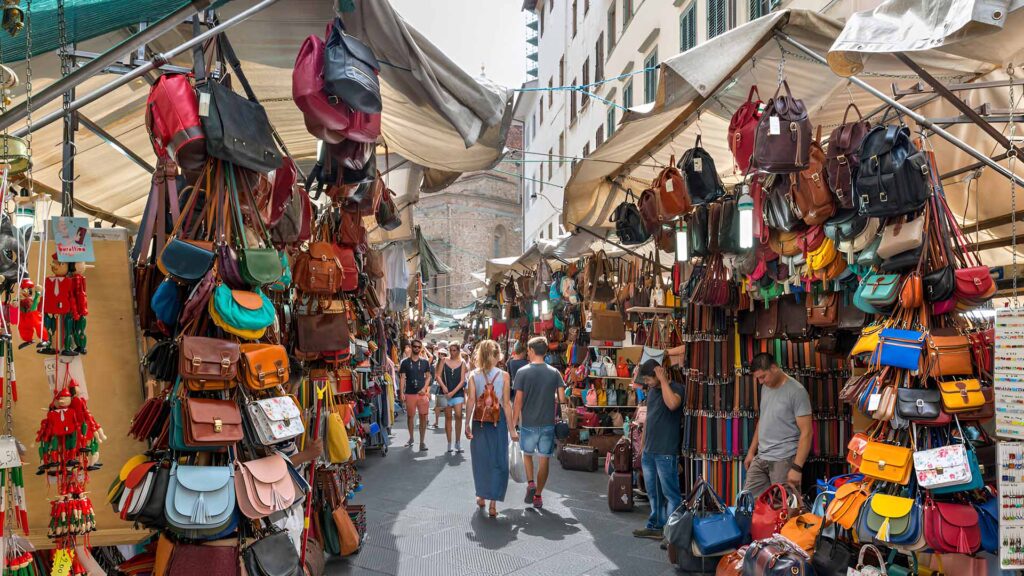
Housing Options
Most studying abroad in Florence programs offer several housing choices:
Shared Apartments: You’ll typically share with 2-8 other students in apartments within 25-40 minutes of your study center. Apartments (usually) include kitchens, common areas, and laundry facilities. This option offers independence and the chance to cook your own meals (a great way to save money and practice Italian at the markets).
Homestays: Living with an Italian family provides unparalleled language practice and cultural immersion. Most Homestays include meals, which gives you insight into daily Italian life and cooking traditions. Despite what you might worry about, homestays don’t typically come with curfews, and you’ll be treated as an independent adult family member.
Italian Roommate Programs: Some programs offer the chance to live with Italian university students, creating built-in opportunities for cultural exchange and local friendships.
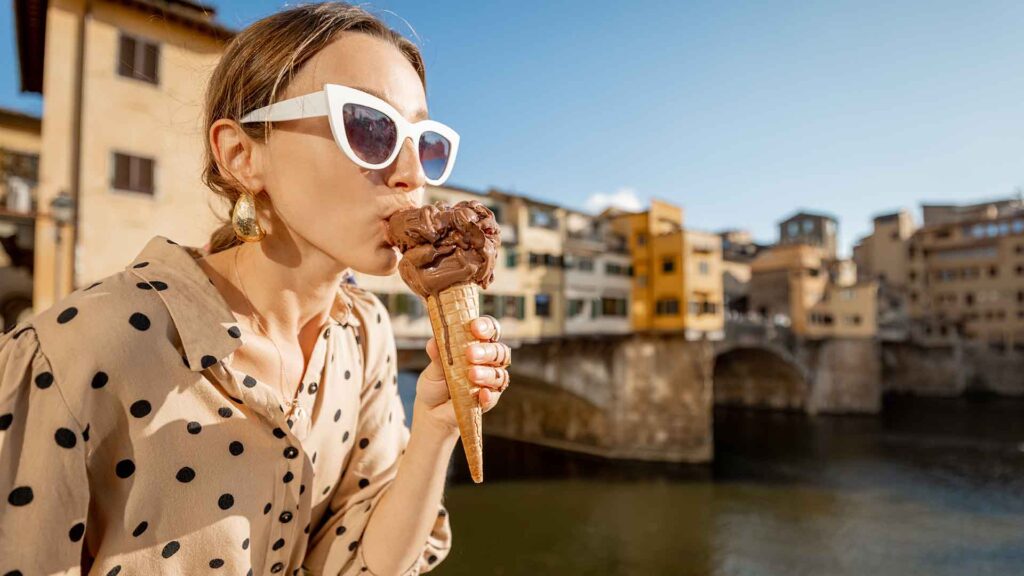
Cost of Living
Florence can be more affordable than Rome or Milan but requires smart budgeting. Expect to spend:
- Groceries: €150-250/month if cooking at home
- Eating out: €8-15 for lunch, €15-30 for dinner
- Coffee: €1.50 standing at the bar (sitting down costs more)
- Bus pass: €35-45/month (some providers include it in program fees)
- Weekend trips: €50-200 depending on destination
- Gelato: €2-4 (essential budgeting category)
Pro tip: Eat where the locals eat. If you see a restaurant full of tourists, keep walking. The best food is often found in neighborhood trattorias where menus aren’t translated into five languages.
Transportation
Florence’s historic center is best explored on foot, but for reaching your housing or exploring beyond the city walls:
- Walking: Your primary mode of transport
- Buses: Extensive AT Bus network covers the city and beyond
- Bikes: Florence is increasingly bike-friendly with dedicated lanes and bike-sharing programs
- Trains: Italy’s excellent rail system makes weekend trips to the outskirts of Florence, to Rome, Venice, Cinque Terre, or smaller Tuscan towns easy and affordable
Language Considerations
While you can get by with English in tourist areas, learning Italian transforms your experience. Most programs include Italian language instruction, and even basic phrases open doors. Florentines speak with a distinctive accent and vocabulary, adding to the charm. Start with basics before arrival: modern Standard Italian is actually based on Tuscan dialect.
- “Buongiorno” (good morning) until 1-2 PM, then “Buonasera” (good evening)
- “Per favore” (please) and “Grazie” (thank you)
- “Scusi” (excuse me/sorry)
- “Prego” (you’re welcome/please/after you—it’s wonderfully versatile)
Culture and Lifestyle
Florentines live at a different pace. Shops close for lunch. Dinner doesn’t start until 8 PM. Sunday is for family. This slower rhythm might frustrate you initially, but it’s actually one of your most valuable lessons—learning to be rather than constantly do.
Key cultural notes:
- Direct communication: Italians value honesty and aren’t afraid of passionate discussion
- Relationship-focused: Building personal connections matters more than efficiency
- Fashion-conscious: Florentines dress well; your college sweatpants will mark you as a tourist
- Family-oriented: Many Florentines live near their extended families their entire lives
- Pride in heritage: Locals are deeply proud of their city and eager to share it with respectful visitors
Making the Most of Your Time
Beyond Tourism
To truly experience Florence rather than just visit it, consider:
Local Markets: Sant’Ambrogio or San Lorenzo market is where locals shop for fresh produce, cheese, and meat. Shopping here—even if your Italian is limited—connects you to the rhythms of seasonal eating and community life.
Neighborhoods: Explore beyond the Duomo-Uffizi-Accademia triangle. Get lost in Oltrarno, discover the views from San Miniato al Monte, join locals for aperitivo in Santo Spirito, or visit the local artisans shops in the San Niccolò area.
Volunteering: Join volunteer opportunities with local organizations through your program—options range from English conversation programs to environmental initiatives and social services.
Italian Students: Participate in some of the tandem language exchanges or events where you can meet Italian university students. These friendships often become the highlight of study abroad experiences.
Weekend Adventures
Florence’s central location makes it perfect for exploring Italy and beyond:
Easy Day Trips:
- Siena and San Gimignano (medieval Tuscan gems)
- Pisa and Lucca (beyond the leaning tower)
- Chianti wine country (rolling hills and vineyards)
- Bologna (university town with incredible food)
- The Apennines (for those who love the mountain experience)
- Hikes and bike trails around Florence (to see stunning views over the town)
Weekend Trips:
- Rome (90 minutes by train)
- Venice (2 hours by train)
- Cinque Terre (stunning coastal villages)
- Milan (fashion capital)
- Verona and Lake Garda (Romeo and Juliet’s city)
- Bolzano and the Dolomites (the real mountain experience)
- Isola d’Elba (the largest island of Tuscany)
Budget Travel: Italy’s rail system makes travel affordable if you book in advance. Consider Eurail passes if you’re planning multiple trips outside of Italy. Budget airlines like Ryanair and Wizz Air connect Florence to other European cities for incredibly low fares.
Sustainable Travel Practices
As you study abroad in Florence, consider your impact:
- Stay local and engage deeply: Staying local means more than reducing travel. It means fully immersing yourself in your host community. You can explore Florence’s neighborhoods, cultural centers, and natural surroundings. Join local events, volunteer opportunities, and student clubs to build authentic connections and discover hidden gems that tourists overlook. When you travel beyond Florence, choose trains or buses over planes whenever possible, and prioritize slower, more intentional ways of exploring. By staying local, you’ll gain a richer, more genuine understanding of the place you’re calling home while minimizing your environmental footprint.
- Support local businesses: Eat at family-owned restaurants, shop at local markets, buy souvenirs from artisan workshops.
- Use public transportation: Trains, buses, and walking instead of flights when possible.
- Respect local communities: Remember that Florence is home to 400,000 people who navigate your presence daily.
- Join the #EnjoyRespectFirenze campaign: Learn what it means to be a responsible visitor.
Academic Success Abroad
Credit Transfer
Before committing to any program, work with your home university’s study abroad office to ensure credits will transfer. Most reputable programs partner with accredited U.S. universities that serve as schools of record, making credit transfer straightforward.
Key questions to ask:
- Will these courses count toward my major requirements?
- How do pass/fail versus graded courses affect my GPA?
- Are there limits on how many study abroad credits can apply to my degree?
Balancing Academics and Experience
Study abroad is about both academic growth and personal development. Successful students:
- Attend class consistently: Students are required to attend all classes, and smaller class sizes mean your absence will be noticed and can impact your learning experience
- Complete assignments on time: Don’t let travel plans interfere with deadlines
- Use the city as your resource: If you’re writing a paper on Renaissance art, spend afternoons in museums, or engage directly with the city as an essential learning tool
- Manage your time: Block out study time rather than cramming the night before exams
- Take advantage of office hours: Your professors are often experts living in Florence who can offer insights beyond the classroom
Skills You'll Develop
Beyond course content, studying abroad in Florence develops crucial competencies:
- Cultural intelligence: Understanding and navigating different cultural norms
- Adaptability: Thriving when everything from language to transportation to food is unfamiliar
- Independence: Solving problems without your usual support network
- Communication: Expressing yourself across language barriers
- Global perspective: Understanding how your worldview is shaped by your culture
These skills increasingly differentiate graduates in competitive job markets.
Health, Safety, and Wellness
Safety in Florence
Florence is generally very safe, but like any major tourist destination, petty theft occurs. Basic precautions include:
- Keep valuables secure and close to your body
- Remain alert and aware of your surroundings, especially in crowded tourist areas
- Don’t leave bags unattended
- Use ATMs inside banks rather than on streets
- Know your program’s 24/7 emergency contact information
Healthcare
- Bring any prescription medications in original packaging with a doctor’s note
- Italian pharmacies (farmacie) are incredibly helpful and pharmacists can often provide minor medical advice
- Do not have medication shipped, it might not be allowed into the country due to different legal permissions
- Consider carrying along the medication you need for the duration of the program. Or consult with your program manager and doctor back home
Mental Health and Culture Shock
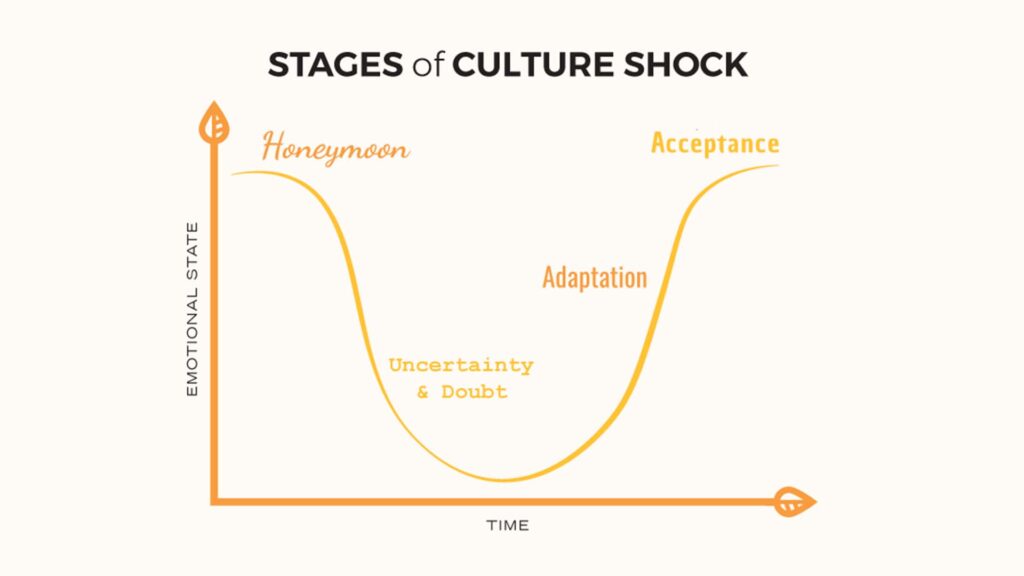
Study abroad is exciting but also stressful. Culture shock typically follows a pattern:
- Honeymoon phase: Everything is amazing and new (weeks 1-3)
- Uncertainty & Doubt phase: Small annoyances feel overwhelming, you may question your decision (weeks 3-8)
- Adaptation phase: You develop coping strategies and start feeling more comfortable (weeks 8-12)
- Acceptance phase: You feel confident and competent navigating daily life (week 12+)
Normal challenges include:
- Homesickness
- Language frustration
- Feeling isolated despite being surrounded by people
- Anxiety about academic performance in a new system
- Exhaustion from constant cultural navigation
Most programs offer counseling services. Don’t hesitate to use them—seeking support is a sign of strength, not weakness.
Practical Preparation
Before You Go
3-4 Months Before:
- Apply for your program and complete all paperwork
- Apply for scholarships and any other financial aid
- Research housing options and submit preferences
- Ensure your passport is valid for at least 6 months beyond your return date
- Ensure if you need a visa for the country you are visiting
2 Months Before:
- Book your flight (some providers offer flight credits too)
- Start learning basic Italian
- Read about travel advices
- Read about some geographical, historical and political and social aspects of the country you are visiting
- Research your host neighborhood
- Set up international banking (notify your bank of travel dates)
- Purchase any required textbooks or materials (or you can also buy them in Florence)
1 Month Before:
- Pack (see list below)
- Download useful apps (Google Maps offline, Duolingo, WhatsApp, Citymapper)
- Make copies of important documents and also save them online
- Arrange housing details and program pickup
- Say goodbye to friends and family
- Consider starting a journal or blog to document your experiences and reflections
Packing Essentials
Documents (keep copies separate from originals):
- Passport
- Visa (if required for your program length)
- Health insurance card
- Emergency contacts
- Copies of prescriptions
- Bank/credit card information
Clothing:
- Comfortable walking shoes (you’ll walk 5-10 miles daily)
- Versatile layers (Florence has hot summers and chilly winters)
- Clothes that work in both casual and dressier settings
- Rain jacket or umbrella
- Scarf (essential for visiting churches)
Electronics:
- Laptop/tablet
- Phone (unlocked for Italian SIM cards)
- Universal adapter and power converters
- Portable charger
- Camera (though phone cameras are often sufficient)
Don’t Overpack: You’ll buy clothes and souvenirs abroad. Most students bring too much and end up donating items before returning home. When in doubt, leave it out.
Money Matters
Banking:
- Notify your bank of travel dates and destination to avoid frozen cards
- Get a debit card with no foreign transaction fees
- Bring both Visa and Mastercard (not all places accept both)
- Know your daily withdrawal limits
Budgeting:
Beyond program fees and housing, budget for:
- Weekend travel
- Meals not covered by program
- Local transportation
- Entertainment and activities
- Souvenirs and personal items
- Emergency fund
Most students spend $2,000-4,000 beyond program costs for a semester, though spending varies widely based on lifestyle choices.
Choosing the Right Program
With dozens of Florence study abroad programs available, how do you choose? Consider:
Accreditation and Quality
- Is the program affiliated with a recognized U.S. university?
- What are the faculty credentials?
- Does the program have experienced leadership and staff in Florence?
- What is the program’s educational philosophy and approach?
Academic Fit
- Does the program offer courses in your major or interests?
- Can you fulfill degree requirements while abroad?
- What’s the teaching style (lecture vs. experiential)?
- What’s the average class size?
Support Services
- Is there local staff available 24/7?
- What orientation and cultural programming is included?
- How does the program handle emergencies?
Health and Safety
- What safety protocols and emergency procedures are in place?
- What medical facilities and pharmacies are easily accessible?
- How does the program support students with pre-existing health conditions?
- What mental health resources are available?
Housing and Logistics
- What housing options are available?
- How far is housing from the study center?
- Are meals included or will you need to budget for food?
- What’s included in the program fee versus what you’ll pay separately?
Program Philosophy
Perhaps most importantly, what’s the program’s philosophy? Some programs focus on:
- Integrated experiential learning: Combining classroom instruction with field visits, hands-on projects, and community engagement
- Cultural immersion: Maximum integration with Italian life through homestays and language requirements
- Professional development: Internships and career-focused experiences
- Sustainability and social impact: Connecting coursework to real-world challenges and community engagement
- Specialized disciplines: Art schools, business programs, or specific academic focuses
Choose a program whose values align with your goals for the experience.
Beyond Traditional Programs
Look for programs that offer innovative approaches:
- Project-based learning: Working on real challenges facing Florence
- Community partnerships: Collaborating with local organizations on meaningful work
- Interdisciplinary approaches: Connecting sustainability, business, arts, and social sciences
- Leadership development: Building skills in innovation, collaboration, and systems thinking
Programs with these elements often provide the most transformative experiences because they move beyond tourism to genuine engagement with place.
The Authentica Florence Difference
While many excellent programs exist, study abroad in Florence by Authentica offers something unique for students passionate about sustainability and social impact.
Sustainability-Focused Curriculum
Authentica’s curriculum centers on the UN Sustainable Development Goals, using Florence and Italy as case studies for understanding how global challenges translate to local contexts. Courses examine:
- Sustainable tourism and urban planning in historic cities
- Circular economy and renewable energy initiatives
- Social entrepreneurship and innovation
- Migration, regional equity, and over-tourism challenges
- The Slow Food movement and sustainable agriculture
This approach helps students understand sustainability not as an abstract concept but as lived reality in a complex urban environment.
Project-Based Learning
The Innovation in Action course engages students in hands-on projects addressing real challenges. Working in teams, students develop practical solutions that foster social change. This experiential approach builds:
- Critical thinking and problem-solving skills
- Collaboration across disciplines
- Design thinking methodologies
- Professional presentation skills
- Understanding of social entrepreneurship across public, private, and citizen sectors
Community Integration
Located in the heart of Florence near Santa Croce and Sant’Ambrogio, Authentica’s center places students in one of the city’s most authentic neighborhoods. Rather than being isolated in a tourist bubble, students live and learn among Florentines.
The program includes:
- Co-curricular programming connecting coursework to community
- Field visits to local organizations and initiatives
- Volunteering opportunities
- Professional development workshops
- Networking with local changemakers
Italian Language and Culture
Language learning is integrated throughout the program because cultural immersion requires communication. Students develop Italian skills through dedicated instruction and daily practice in their neighborhood.
Accreditation and Quality
Courses are transcripted by Florida Agricultural & Mechanical University (FAMU), ensuring credit transfer to U.S. institutions.
Financial Support and Accessibility
Authentica is committed to making study abroad accessible through multiple financial support programs:
SCALE Scholarship Program: The Sustainability Champions Abroad Learning Experience (SCALE) offers merit-based scholarships ranging from $100-200 Spark Scholar awards to full program fee coverage for Summit Scholars. The program recognizes students at all levels of sustainability engagement—from those just beginning to explore global issues to established student leaders driving meaningful change. Awards are based on demonstrated interest in sustainability, leadership potential, and financial need. With four scholarship tiers (Summit, Catalyst, Momentum, and Spark), SCALE ensures students from diverse backgrounds can access transformative education abroad.
JetSet Flight Credits: One of the largest expenses of studying abroad is airfare. Authentica’s JetSet Flight Credits program rewards early decision-makers with substantial savings toward flights. Spring 2026 applicants can earn up to $1,000 in flight credits by applying early, while Summer 2026 students can receive $500 credits. These credits are applied directly to your program invoice after enrollment confirmation, making international education significantly more affordable. Students can book flights independently or work with Authentica’s trusted partner, Voyzant.
Changemaker Crew: Join Authentica’s founding student-led Changemaker Crew—a paid campus ambassador program for globally curious students passionate about sustainability and purpose-driven travel. Crew members earn $20/hour for 5 hours per week while gaining professional development, mentorship, content creation experience, and networking opportunities with sustainability professionals. This isn’t just about promoting programs; it’s about being part of a community shaping the future of meaningful study abroad while building valuable skills and earning benefits toward program costs.
Friend Referral Program: Study abroad is better with friends. Authentica’s Friend Referral Program lets you save money when you bring your peers along. Spring 2026 students receive $250 off for each friend who applies and enrolls, while Summer 2026 students save $100 per referral—and your friends get the same discount. There’s no limit on referrals, making it easy to create an instant community abroad while making the experience more affordable for everyone. When your friend applies, they simply write your full name in the referral field, and once both of you submit your deposits, the discounts are automatically applied to your program balance.
Affordable and Accessible
Beyond scholarships, Authentica offers competitive pricing with early bird discounts. The program fee includes:
- All courses and materials
- Housing (apartments or homestays)
- One-day excursion to destinations like sustainable farms, medieval Tuscan towns, or other cities within easy travel time outside Tuscany
- Guided museum visit
- Cooking class
- Italian language classes
- Welcome and farewell dinners
- Weekly co-curricular activities
- Bus pass
- International insurance
- Airport pickup
- 24/7 staff support
Life After Florence
Reverse Culture Shock
Returning home can be harder than adjusting to Florence. You’ve changed, but everything at home has stayed the same. You’ll struggle to explain your experience to people who ask “How was it?” in the grocery store checkout line.
Give yourself grace in this transition. Stay connected with friends you made abroad. Find ways to apply what you learned to your life at home. Consider joining student groups focused on international affairs, sustainability, or Italian culture.
Leveraging Your Experience
Study abroad in Florence provides experiences and skills that differentiate you professionally:
On Your Resume:
- Highlight specific projects and accomplishments
- Emphasize cross-cultural communication skills
- Mention language proficiency gained
- Note leadership roles in group projects
In Interviews:
- Prepare specific stories demonstrating adaptability
- Discuss challenges you overcame
- Explain how the experience shaped your career interests
- Show how you applied classroom learning to real situations
In Applications:
- Graduate schools value international experience
- Many employers prioritize global competency
- Fellowships like Fulbright favor candidates with prior international experience
Staying Connected
After your program ends:
- Stay in touch with program alumni through social media groups
- Consider returning to Florence for graduate studies or work
- Look for opportunities to use your language skills at home
- Share your experience with students considering study abroad
- Stay engaged with issues you learned about (sustainability, social entrepreneurship, etc.)
Final Thoughts: Your Renaissance Awaits
Choosing to study abroad in Florence is choosing transformation. You’ll return with more than credits on a transcript—you’ll carry new perspectives, unexpected friendships, hard-won confidence, and memories that anchor you for life.
You’ll remember the golden light on terracotta rooftops at sunset. The taste of cacio e pepe at that tiny trattoria your host family recommended. The afternoon you got thoroughly lost and stumbled into a hidden piazza. The moment Italian finally clicked and you had your first real conversation. The confidence you felt navigating train stations and bus routes in a language that wasn’t yours. The friends from around the world who became family.
Florence taught the world about humanism, beauty, and innovation during the Renaissance. Today, it’s pioneering new approaches to sustainable urban life and wrestling with how to preserve heritage while building the future. By studying abroad in Florence, you join this ongoing conversation about how we create cities and communities where both people and planet can flourish.
The cobblestones are waiting. The gelato is calling. Your Renaissance is ready to begin.

